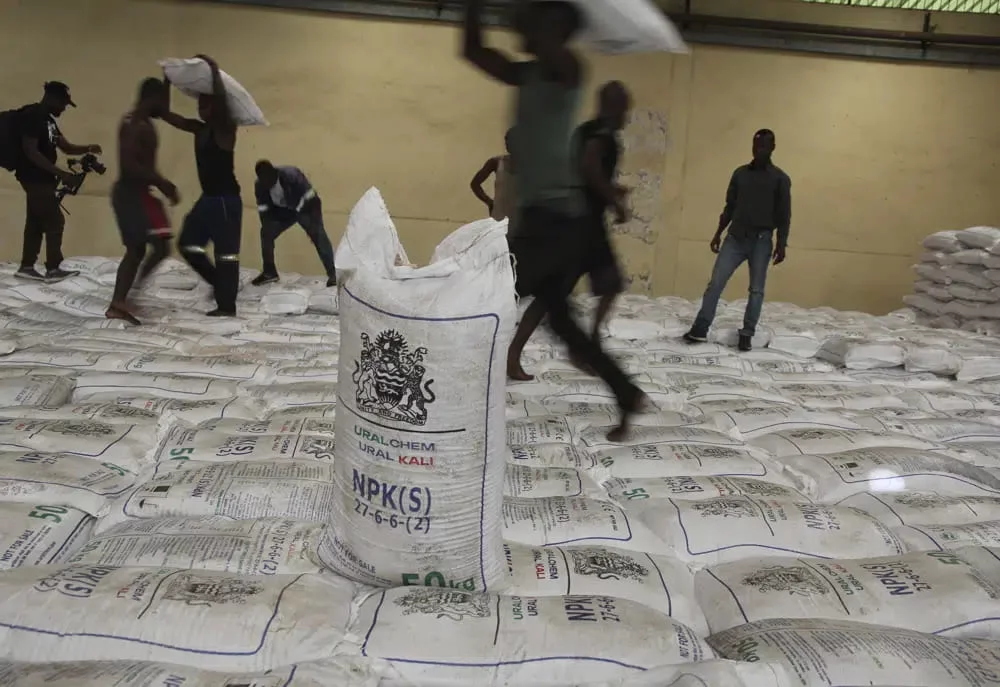The Ministry of Agriculture has said it penned the K128 billion Affordable Inputs Programme (AIP) deal after a thorough assessment of the Romanian firm East Bridge Estate’s capacity to supply fertiliser.
Speaking after a flurry of accusations that the firm is not into fertiliser supply but medical equipment, Minister of Agriculture Sam Kawale said the deal was cleared by vetting institutions.
East Bridge Estate deal to supply 600 000 metric tonnes
He listed the Public Procurement and Disposal of Assets Authority, the Anti-Corruption Bureau, the Financial Intelligence Authority, the Attorney General’s Office and ministries of Trade and Finance as the institutions they engaged.
“We have followed all procurement provisions, and no law was broken… we did the assessment and ensured that they have a production line, and are able to supply,” he said in response to our questionnaire on Saturday.
According to on Saturday’s Weekend Nation, the government, through the Ministry of Agriculture, has offered East Bridge Estate a deal to supply 600 000 metric tonnes (MT) of fertiliser worth $124.5 million (about K128 billion).
The Romanian company is expected to supply 300 000 MT of Urea and 300 000 MT of NPK under a commodity exchange/barter agreement in a contract to run until July 24 2024.
The ministry and the company signed a Sale and Purchase Agreement on December 14 2022 and then a Commodity Exchange Agreement on March 23 2023 before issuing an addendum on May 18 2023.
The deal comes on the back of last year’s botched AIP fertiliser deal with a United Kingdom-based butchery through which government lost K750 million.
In the Romanian firm’s deal, government will pay through supply of farm commodities which include 250 000 MT of soya beans, 250 000 MT of groundnuts, 200 000 MT each of pigeon peas and maize, 50 000 MT each of rice and sorghum and 25 000 MT each of cotton and sugar.
Asked about the country’s capacity to supply those commodities, Kawale said an assessment showed that it is feasible.
“The Ministry of Agriculture did all assessments with the Ministry of Trade and the supplier. We analysed everything and were satisfied that we can supply what they need, and still have left over to sell elsewhere,” he said.
The minister was, however, quick to state that the targeted AIP is not for 2023/24 growing season.
“The funds for 2023/24 AIP are intact. We will be awarding contracts to about 15 companies very soon using the budgeted funds. The East Bridge fertiliser is not for this year’s AIP,” he pointed out.
On his part, Minister of Trade and Industry Simplex Chithyola Banda said his portfolio looked at the deal as beneficial as it would boost agricultural productivity.
“The intertwined kind of relationship which is built between the ministries because what happens to agriculture also affects trading and financing.
“If there is a good deal that has been initiated by the Ministry of Agriculture which will improve and increase agriculture production, it means, we will have more to generate enough revenue that can help run this country,” he said in a telephone interview on Saturday.
FIA senior public relations officer Grace Thipa also confirmed that they were involved in the deal assessment.
“I can confirm that FIA submitted a due diligence report to the Ministry of Agriculture,” she said.
Thipa, however, could not be drawn to reveal the content of the report, saying: “You may require the contents from the ministry.”
The company, according to the Weekend Nation, is expected to make its initial delivery of 50 000 MT of Urea on July 25 2023 while the last consignment of 50 000 MT each of Urea and NPK will be made on July 25 2024.
And, Chithyola signalled that it is the firm which will be the first to send its products.
The post Govt explains fertiliser deal first appeared on The Nation Online.
 Moni Malawi
Moni Malawi 

